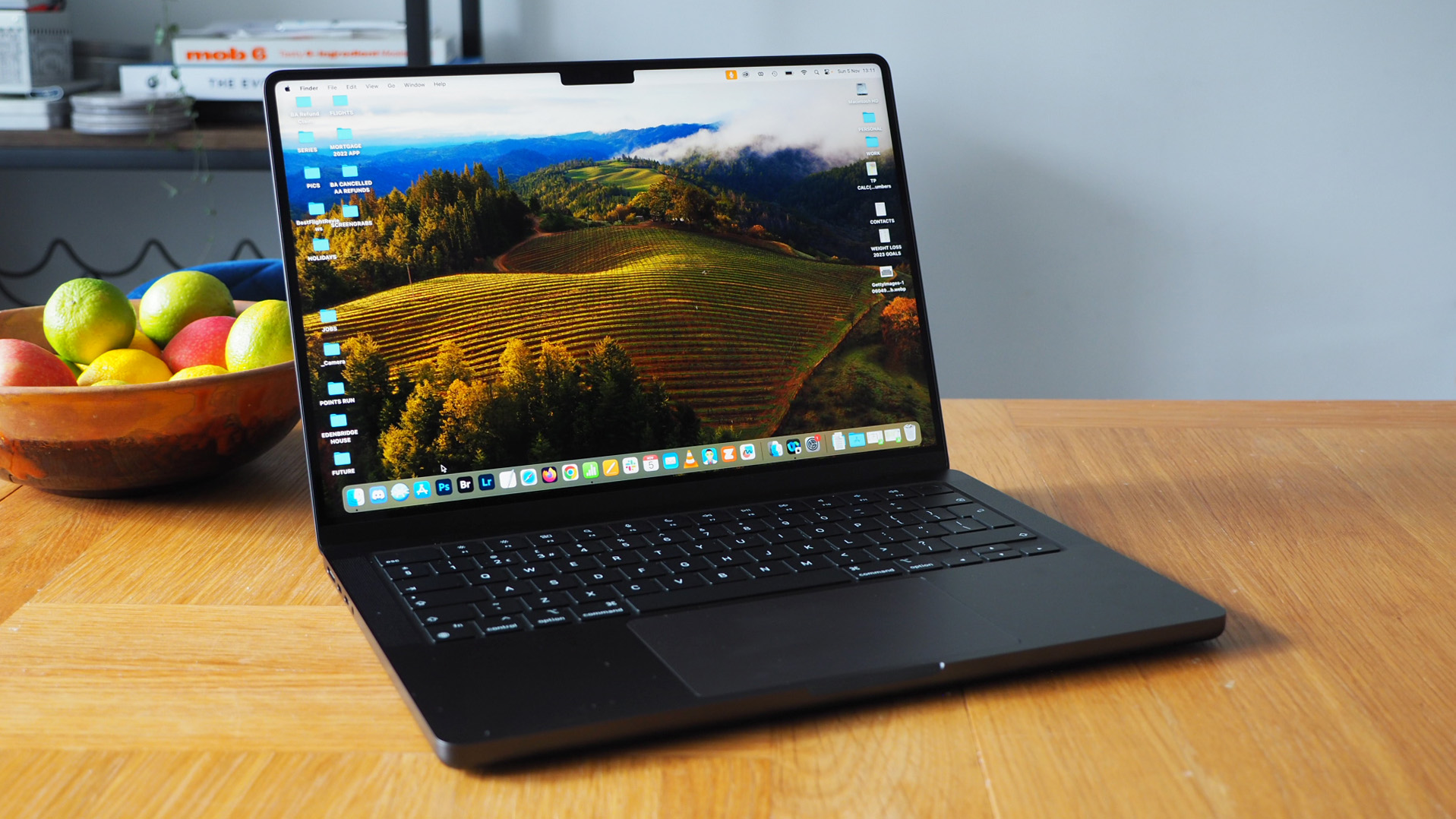
It feels like only a heartbeat ago I was reviewing the last MacBook Pro – the 16-inch M2 Pro model, which was on my desk just nine months ago in January 2023 – and quickly realising it was not only among the best MacBooks money could buy, but ultimately one of the best laptops on the planet.
That a new MacBook Pro has arrived so soon after seems somewhat peculiar to me, but I'm not complaining: the all-new M3 silicon (as revealed in the 'Scary Fast' event) is here to reign supreme and, in this 14-inch MacBook Pro M3 Max model on review, it's truly outstanding.
Not only that, dressed in the also all-new Space Black finish (which I'm mildly obsessed with – all Apple products should offer Space Black), and with a lower entry-level price, can the late 2023 MacBook Pro M3 series do no wrong? I've been using one for a full working week and there's no doubt in my mind it delivers an almost out-of-this-world experience.
MacBook Pro M3 2023: Price & Availability
In today's economic climate all products seem to rise by big percentages generation to generation. So what's this? The M3 MacBook Pro is cheaper than the M2 equivalent? That's right – and by quite a substantial margin. The 14-inch M2 models were priced from $1,999 / £2,149 / AU$3,199, but the M3 at its entry-level configuration is priced from $1,599 / £1,699 / AU$2,699. Check out the table below for at-a-glance prices in key territories:
Of course I have the M3 Max-toting MacBook Pro on review here, so it's towards the top end. An entry-level Max in the 14-inch body is £3,299 / $3,199 / AU$5,599. But mine has the uprated chip with 16‑core CPU, 40‑core GPU and 16‑core Neural Engine, plus 64GB unified memory – bringing the total to a rather handsome (or not) £3,999 / $3,899 / AU$6,649. The 16-inch model maxed out can almost double that.
But I think there's a proposition of value here – and in this user-configurable format you can build a MacBook Pro that suits your needs and, to some degree, budget. What it delivers makes it well worth it in my view, just don't overreach for no distinct reason. The most disappointed people, however, are likely to be recent M2 buyers whose MacBook Pro models are no longer part of the line-up – it's almost as if they never existed.
MacBook Pro M3 (2023) review: What's New?
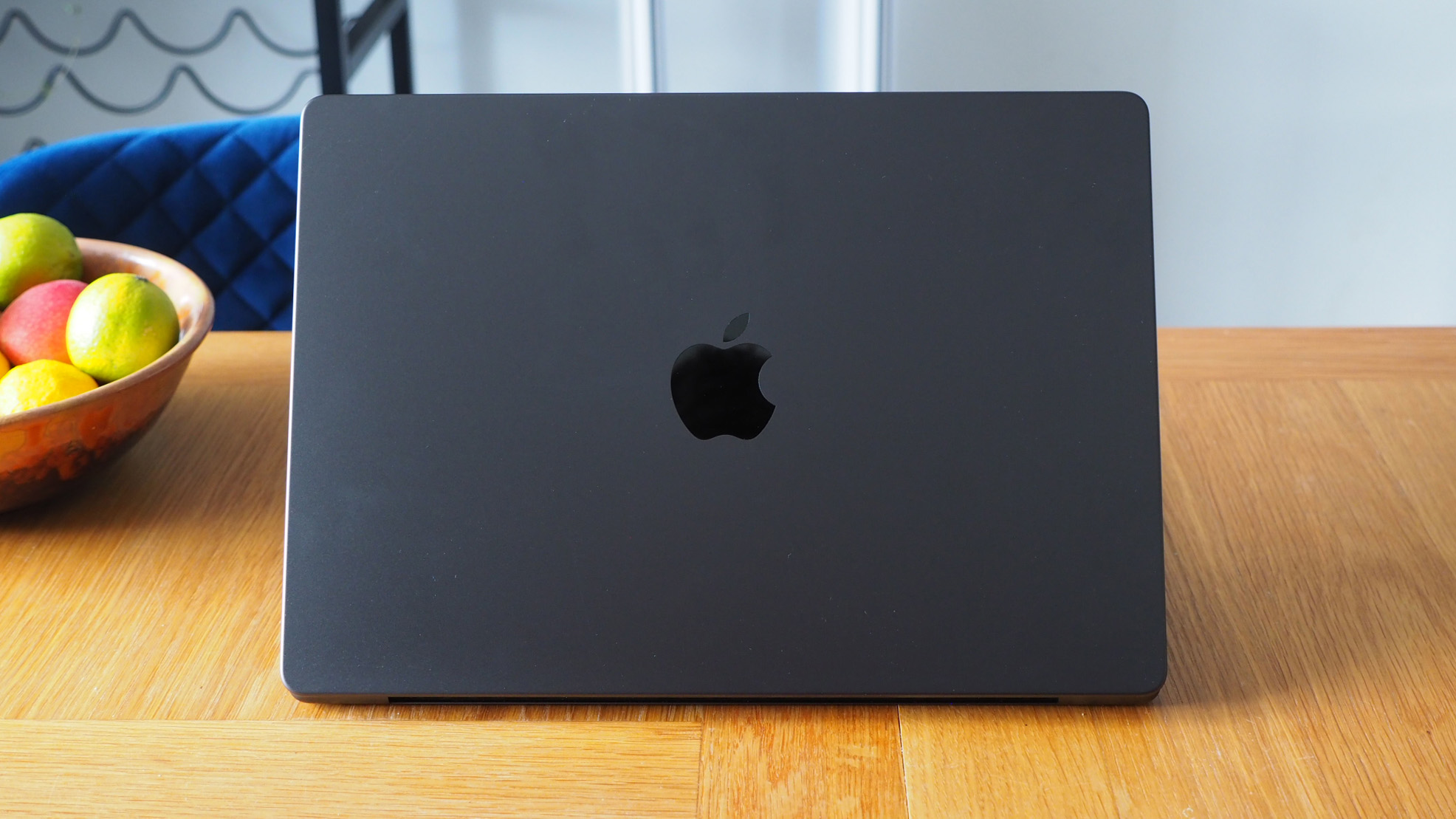
So just what is new about the late 2023 MacBook Pro? Think of this as a mid-term refresh really, as visually speaking you're getting the same chassis, same screen, same ports – pretty much same everything – as the earlier M2 equivalents. But that's not to say there isn't one big change to the exterior – and it's called Space Black.
I've already waxed lyrical about how great-looking this new Space Black finish is and, given the choice, is the option I'd want to buy. It doesn't cost any more to select it and I really like its depth of dark, yet it has a silvery shimmer to it when caught in the right light. It's also got an anti-fingerprint technology finish, applied during the anodisation of the material, to keep it looking more pristine.
Otherwise the key take away with the late 2023 MacBook Pro is the addition of M3 silicon, including Pro and Max variants (no Ultra version has been announced... yet?). Interestingly M3 is a marginally lower clocked processor than its predecessor, but it's architecturally different and, overall, more capable. The benchmarks I've been getting from it (more on that later) are a significant leap – for many people it'll be way beyond requirements even.
MacBook Pro M3 review: Screen & Speakers
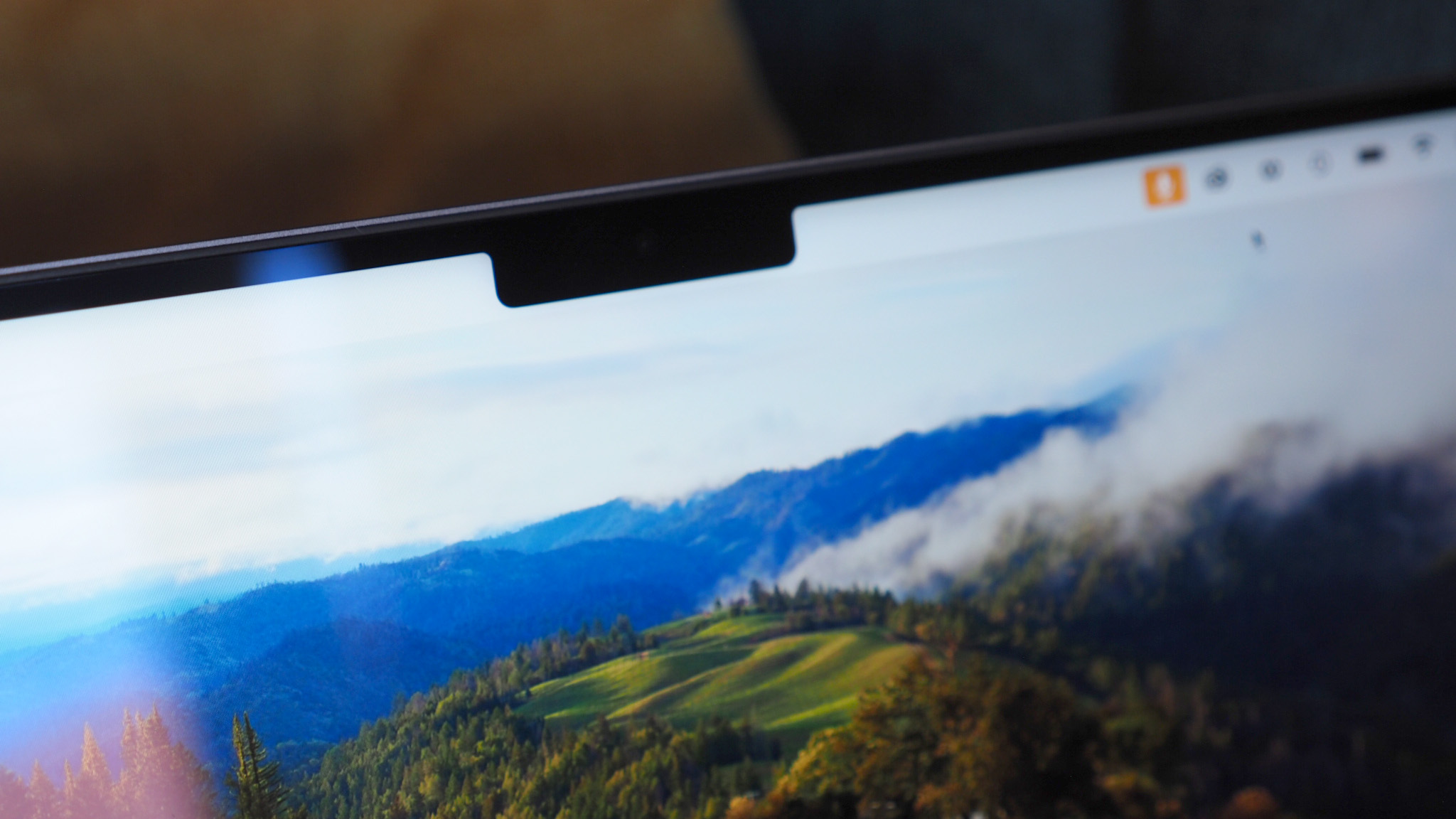
Just because the M3 MacBook Pro doesn't have new everything doesn't mean that everything isn't great. The 14.2-inch Liquid Retina XDR display here, as a key example, is a masterclass in how laptops should deliver their screens.
That panel name may take a little bit of decoding, because it's in Apple language. The 'XDR' bit is the company's way of saying it's Mini LED and high dynamic range (HDR) capable. My way of saying it is that it's super-bright (to 1600 nits) and thanks to a high resolution (3024 x 1964 pixels) and up to 120Hz refresh rate everything looks crisp and smooth.
Apple isn't new to Mini LED now, as it was in the previous-generation MacBook Pro models and also in recent iPad Pro models too. As the name suggests it uses miniature LED backlights to deliver big on brightness, but also big on backlighting precision. That means no light bleed, while contrast is high and black levels extra deep.
As I said in earlier MacBook Pro reviews, Mini LED is an important feature because you really cannot tell the difference between true black in the display and the black bezel surround of the display itself. And because this MacBook has a notched display – i.e. there's a chunk up top where the cameras live which is blacked out – this all but vanishes from view in many apps that 'fill in' the bezel on screen. Yes, I'd prefer to not have a notched screen, but I've not found it a bother – after a few hours of initial use I've ceased to notice it.
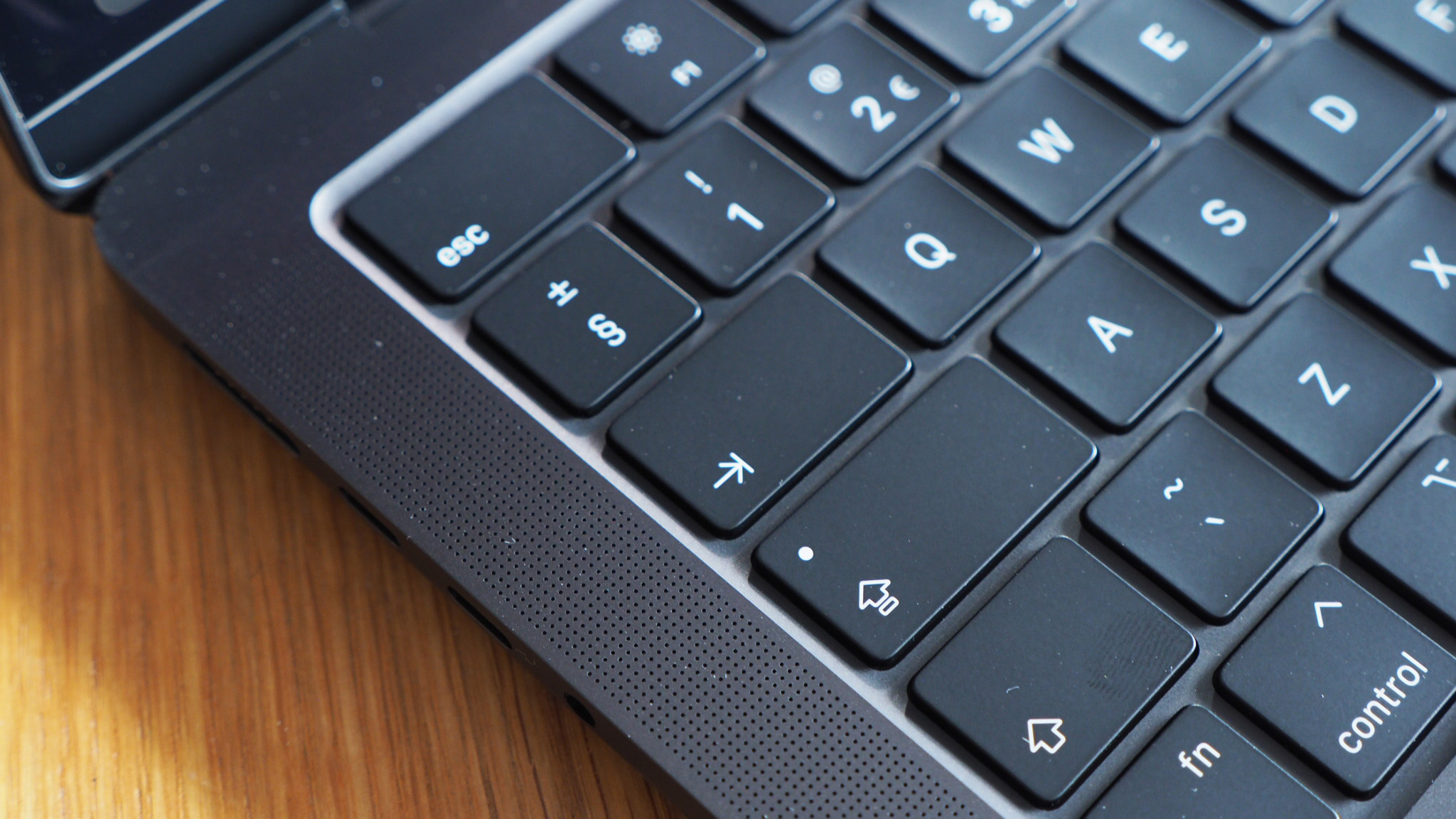
From a top-notch display (it's pun o'clock!) to top-drawer speakers, the MacBook Pro M3 is one seriously impressive-sounding laptop. The audio is mighty impressive across the board, but it's the lower-frequency response that's beyond any competitor I've ever tested (aside from its predecessor or, indeed, the 16-inch model). That gives sound real depth and emphasis that you just don't usually get from a laptop.
There's more too: the six-speaker arrangement here features Spatial Audio support, so when you're playing music mixed in the object-based format or watching a show or movie that's Atmos mixed you'll get the real three-dimensional experience even without wearing headphones. When I'm riding my indoor bike and running Zwift using this MacBook the sounds sometimes genuinely seem as though they're coming from metres away to my side, for example, it's really impressive.
In addition to Bluetooth wireless there's also a 3.5mm jack if you're one who prefers to wire in, while the HDMI 2.1 support also supports multi-channel audio output too. Speaking of ports, the MacBook Pro M3 has them in reasonable abundance: there are also three USB-C/Thunderbolt 4 ports and even a full-size SD card slot (hugely useful for me, as I still shoot using a 'proper' camera – that's what I used to take my review shots on this very page).
The only complaints are: there's no USB-A port here, for which you'll need a separate adaptor instead; that MagSafe 3 isn't an ideal charging solution for everyone (another USB-C wouldn't be amiss); and just because I'm nitpicking that black cable provided with the Space Black finish oddly has a massive white plug for the wall – colour-matching that detail would've looked a lot better, as small details count!
MacBook Pro 14-inch M3 Max review: Performance & Battery
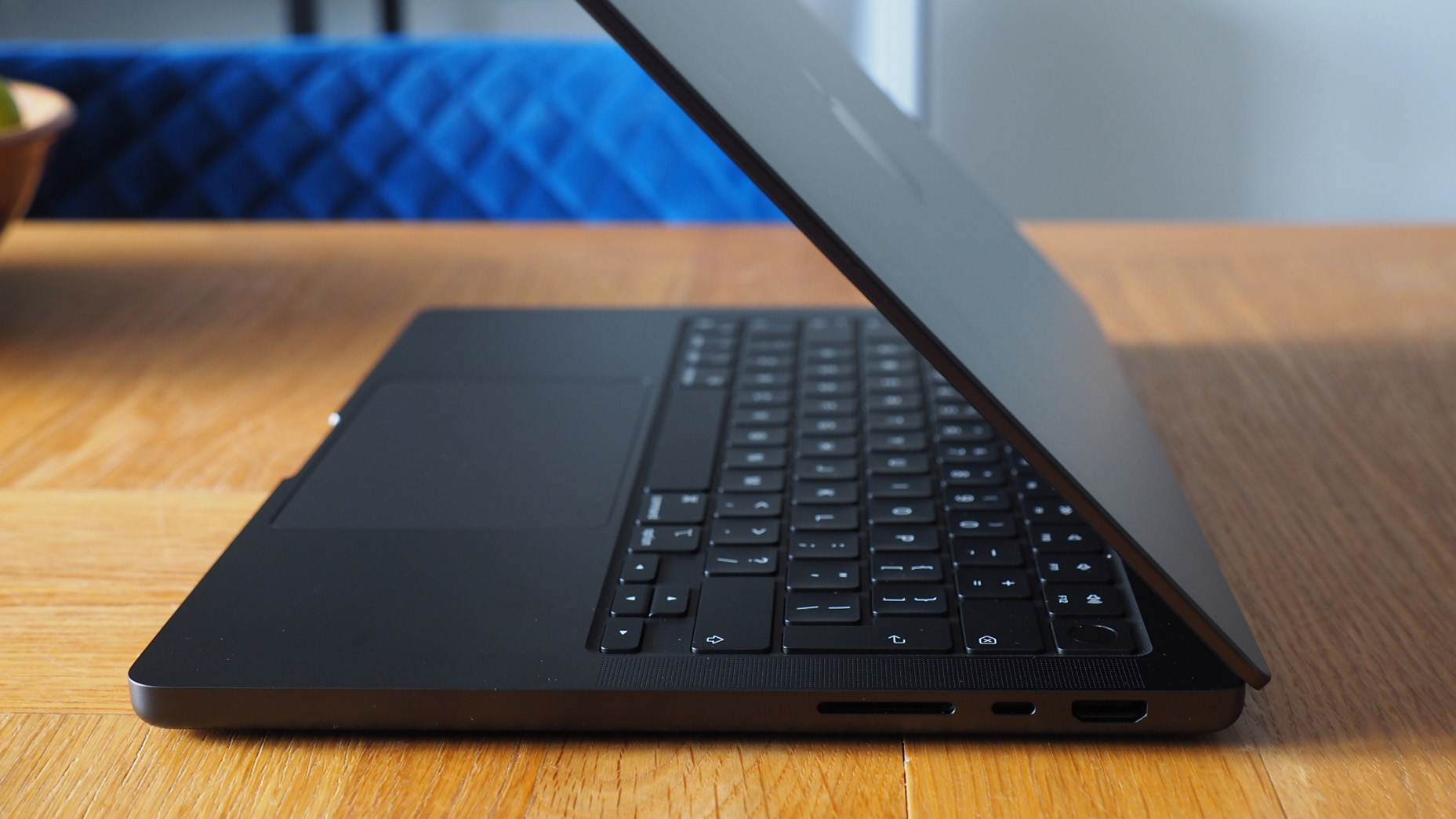
There's no doubting that M3 silicon is massively impressive – in the M3 Max configuration I've got on review it's actually way more than I'd ever need to be honest. As I referenced earlier: don't overpurchase the specification of your MacBook Pro, fit it to your requirements and spend the sum that fits. Because you can upgrade a lot of aspects – which will be great for demanding professionals.
In this section it may seem as though I'm comparing apples to oranges a little bit, because my last MacBook Pro was an M2 Pro (with 32GB unified memory), whereas this review model is an M3 Max (with 64GB) – so not only a generational upgrade, but a further step up that M3 ladder and with double the memory (you can add up to 128GB though, which is rather mind-boggling (and wildly expensive)).
I'm staggered by just how impressive M3 Max is though: it's cut through my Photoshop edits and video renders like a knife through butter. There will be other examples significantly beyond my means, such as if you're working in 3D design and modelling, or produce music and don't fancy bouncing everything down all the time to take the strain off.
When I was testing the 16-inch MacBook Pro M2 Pro model, it benchmark scores came in at 1957 single-core and 15,134 multi-core; 53,000 (Metal) and 46,000 (OpenCL) for graphics. So how does the M3 Max compare to that? A 2357 single-core and 23,177 multi-core equates to around a 20% boost for single and 50% for multi, which is significant. In graphics I've been getting 101,553 (Metal) and 92,478 (OpenCL) – so a doubling of graphics performance.
That's a massive amount of power potential that marks the MacBook Pro M3 Max as a laptop that's as powerful as a desktop. Whether plugged in or unplugged, it's got the flexibility to deliver – although the fans do kick in somewhat aggressively if you're really pushing things. A fanless MacBook Air this is not! I think the Metal score above will also begin to mean more and more as developers begin to produce for Apple native, which means the future of gaming on Mac could become a huge deal too.
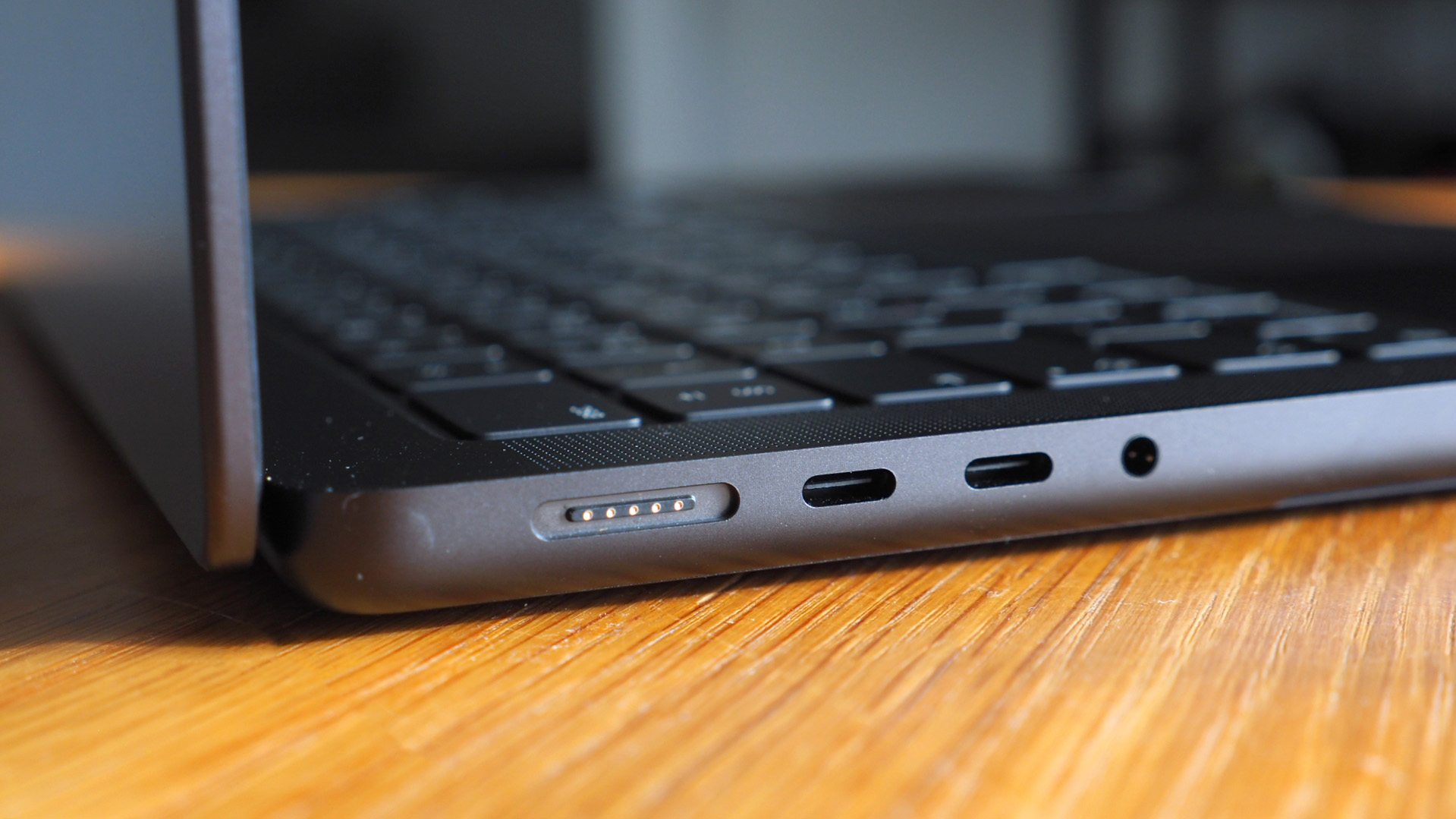
When it comes to battery life that's where there's the compromise between M3, M3 Pro and M3 Max though. The entry-level M3 is said to deliver literally a full day of use per charge. Many colleagues I've been chatting with have run tests with over 24 hours of YouTube streaming being a genuine possibility. That's insane battery life. I, on the other hand, have the M3 Max on test – and while it won't last nearly as long, it's still capable all things considered.
I set a 1440p resolution YouTube video running (I usually select a classic burning fireplace, as there are 12-hour-long videos available on Google's streaming site) with mid-level audio running and brightness set to half and the M3 Max was able to deliver 13.5 hours before calling it a day. I re-ran the test at full brightness and it drops to 8 hours – which goes to show how impactful the Mini LED screen is in the equation.
Either way: the day after these battery tests I used the laptop all day for work with mid-level brightness, and it lasted even longer than the streaming tests. Nothing too strenuous running here, but you can easily use this laptop (even in M3 Max config) on a long-haul flight or when meeting hopping throughout a day and not need to find a plug. And if you're keen on even more battery then consider that the 16-inch model's 100Whr battery is around 43% larger than the 14-inch model's 70Whr one (yes, it powers a bigger screen, but colleagues tell me the 16-inch model's battery life is in line with being around 40% better in like-for-like conditions).
Another great thing about the way Apple's silicon works is that performance isn't hindered when there's no connection to a mains socket. So whether you're plugged in or working mobile, you'll get the same kind of power performance on battery. And just as I said of the earlier 2023 model: while more intense apps will drain the battery quicker, something like Final Cut Pro only seems to push it at about twice the rate, so you could feasibly get many hours of on-the-go editing done with this machine.
MacBook Pro M3 Max 14-inch review: Verdict

If you don't immediately fall in love with the new Space Black finish (as I have) then it won't even matter – for Apple's 14-inch MacBook Pro M3 is such a powerful and accomplished laptop that you'll be simply engulfed by its peerless capability.
With the 13-inch MacBook Pro now dead and buried (RIP Touch Bar, I doubt anybody will miss you), a 15-inch MacBook Air on the market for more casual use-cases, the MacBook Pro in this 14-inch and larger 16-inch versions are perfectly positioned for true pro-grade use. The M3 Max I've had on test is as powerful as a desktop PC, simple as that.
Minor niggles aside – and most won't consider this mid-term upgrade as necessary nine months after the previous-generation model launched – the late 2023 MacBook Pro M3 is an untouchable option for creatives, and I find the 14-inch model perfect for portability's sake. That it's available for even less cash this time around is just icing on an already very sweet cake.
Also consider
A point that's worth stressing: the MacBook Pro M3 won't be for everyone simply because it's so powerful. If you're not pushing highly demanding tasks in its general direction then I'd suggest looking to the MacBook Air 15 and MacBook Air 13 models as step-down options that'll also save you a bunch of cash.







